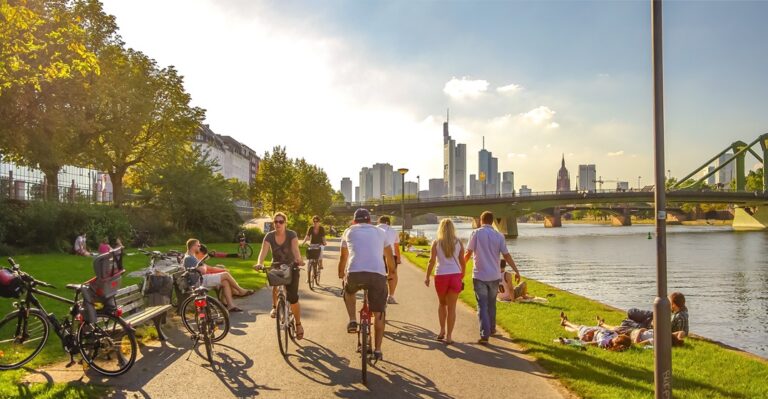Published on April 23, 2024

How to rent an apartment in Germany

Finding the right apartment in Germany can seem daunting, especially for expats and international students unfamiliar with the local norms. This guide will simplify the process, detailing everything from the various types of apartments you can rent to the crucial documents you’ll need to rent an apartment in Germany. We’ll also translate essential rental vocabulary and outline typical German rental contract terms to prepare you for a successful tenancy.
- Types of apartments available in Germany
- How to search for an apartment in Germany
- Which documents do I need to rent an apartment in Germany?
- German rental vocabulary 101
- What to look out for in the German rental contract
Learn languages at your pace
Types of apartments available in Germany
Altbau (old building) vs. Neubau (new building)
German buildings are generally divided into two categories: Altbau and Neubau. Whether you have a preference for one or the other may depend on your budget, tastes and other factors. Here are the key differences:
- Altbau (old building): These buildings are known for their charm and character, which often manifests in the form of high ceilings, ornate facades and large windows. Altbau apartments are typically found in the more established neighborhoods of German cities. They may not have the most modern amenities, but they appeal to those looking for a unique, historical vibe.
- Neubau (new building): Contrary to Altbau, Neubau apartments offer modern comforts and energy efficiency. These buildings are newer constructions with contemporary designs; as such, they tend to be equipped with the latest technology in home automation and energy management. They might be located in newly developed areas or integrated into older neighborhoods with upgraded infrastructure.
Apartment types
You’ll also want to consider the type of apartment appropriate for your living situation. Here are some broad categories you’ll likely encounter:
- Single flats/studios: Ideal for individuals or couples, these one-room apartments come with a combined living and sleeping space, which often includes a built-in kitchenette and separate bathroom. Though small, these flats can be ideal for those moving to Germany alone or for professionals looking for a compact, easy-to-maintain space.
- Shared apartments (Wohngemeinschaften or WGs): Shared apartments are popular among students and young professionals. In a WG, you rent a private bedroom and share common areas like the kitchen and bathroom with roommates. This option can be more affordable and socially enriching, offering a built-in network of contacts in a new city.
- Family apartments: For those moving with family members or planning to live with multiple roommates, larger apartments with multiple bedrooms and more expansive living areas are a good option. These apartments cater to the needs of families and groups needing extra space and comfort.
- Luxury apartments: Available primarily in major cities, these apartments come with high-end finishes, exclusive amenities and often spectacular views. They cater to those seeking a premium living experience, with conveniences like in-building gyms, pools and 24-hour security.
How to search for an apartment in Germany
Finding the right apartment requires a mix of online tools and local insights. Here’s how to effectively begin your search:
Popular portals and websites
- ImmobilienScout24: This website offers a wide range of rental options across Germany. Use filters to narrow down by location, price and type of apartment.
- WG-Gesucht: This site is ideal for finding shared living spaces. It’s particularly useful for students and young professionals.
- Nestpick and Wunderflats: These platforms specialize in furnished apartments — great for expats seeking a quick move-in.
Local resources
- Real estate agents: These agents often speak English and can provide targeted assistance and help with negotiating rental agreements. They’re especially useful for those unfamiliar with the local market.
- Community groups: Local Facebook groups and expat forums can be valuable for tips on available rentals.
Learn languages at your pace
Which documents do I need to rent an apartment in Germany?
To successfully secure a rental in Germany, you’ll need to compile a set of documents to present to potential landlords. Here’s a breakdown of the essential paperwork:
Standard documentation
- Identification: A valid passport or national ID card.
- Proof of income: Recent payslips or a bank statement showing your income.
- Credit report: A SCHUFA report (or equivalent) is often required to verify your creditworthiness.
- Previous rental history: Letters from previous landlords proving you are a reliable tenant, if available.
Additional requirements for foreigners
- Residence permit: If you’re not an EU citizen, you’ll need a valid residence permit.
- Guarantor: Some landlords might require a guarantor (Bürgschaft) to co-sign the rental agreement, especially if your economic stability in Germany is not yet established.
Tips for your document preparation
- Organize early: Gather and organize these documents before you start your apartment hunt.
- Translations: If your documents are not in German, consider having them professionally translated and certified to avoid any misunderstandings.
German rental vocabulary 101
| German | English | Abbreviation |
| Die Kaltmiete | basic rent | KM |
| Die Warmmiete | rent including heating costs | WM |
| Die Nebenkosten | additional costs | NK |
| Die Kaution | security deposit | KT |
| möbiliert | furnished | Möbl. |
| Der Mietvertrag | rental contract | MV |
| Das Übergabeprotokoll | handover protocol | ÜP |
| Die Mieterhöhung | rent increase | MH |
| Der Einzugstermin | move-in date | EZT |
| Die Untermiete | sublet | UM |
| Die Kündigungsfrist | notice period | KF |
| Die Wohnfläche | living area | WF |
| Der Wohnberechtigungsschein | subsidized housing permit | WBS |
| Die Einbauküche | fitted kitchen | EBK |
| provisionsfrei | no broker fee | PF |
| Die Zentralheizung | central heating | ZH |
| Die Etagenheizung | floor heating | EH |
| Der Balkon/die Terrasse | balcony/terrace | BT |
| Der Garten | garden | Gtn. |
What to look out for in the German rental contract
German rental agreements include specific terms and conditions essential for a clear understanding between landlord and tenant. Here are the key elements you’ll commonly find:
Contract components
- Lease term: This specifies the length of the rental term; for example, a one-year fixed term or an indefinite lease with standard notice periods.
- Rent details: The contract should clearly state the monthly Kaltmiete and Warmmiete, the latter of which should be higher because it includes heating and water. The contract should also outline terms and conditions for any future rent increases linked to inflation or improvements.
- Security deposit: The deposit due at signing is usually three months of Kaltmiete, which is held against potential damages.
Common clauses
- Maintenance responsibilities: Specifies that the tenant must handle minor repairs, while the landlord is responsible for major repairs and structural maintenance.
- Subletting rules: Indicates whether the tenant is allowed to sublet, and under what conditions.
- House rules: Could include quiet hours (10 p.m. to 7 a.m.), pet policies or guidelines for using the balcony.
- Termination requirements: Typically requires three months’ notice from either party, with procedures for early termination if agreed upon.
Learn languages at your pace
How to rent a flat in Germany
Navigating the rental market in Germany can be frustrating, but it’s much easier with the right knowledge and preparation. If mastering the German language is also on your agenda, think of the process as a way to help you learn key vocabulary. You may even want to challenge yourself by trying to hold a conversation with your real estate agent or landlord in German, or by reading your rental contract without help from a translator. Just remember that learning German — and renting an apartment in Germany, for that matter — doesn’t have to be difficult. With a bit of patience, persistence and local help, you’ll be well on your way to a new life in Germany.













